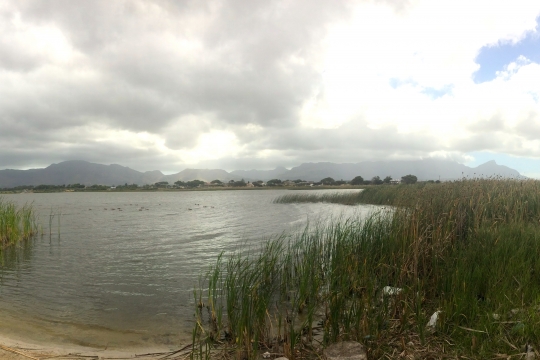CAPE TOWN, SOUTH AFRICA: Local economics researchers have hailed the announcement this month that the City of Cape Town will reverse a decision to sell a section of the Princess Vlei wetland near Diep River to developers, who planned to build a shopping mall. Left untouched, this urban wetland still has a significant value which can be measured in rands and cents terms, researchers maintain.
‘The benefits of keeping green spaces within cities healthy and intact can be measured in several ways, which can have an economic value attached to them,’ says resource economist Dr Jane Turpie, commenting on the move.
‘Healthy wetlands, grasslands and forests in cities can help buffer against flooding, for instance, or help a city cope with pollution. They can be carbon sinks, which has a climate mitigation value. And their contribution to people’s physical and psychological wellbeing is also very significant.’
 Places to play: natural green spaces in cities give residents a place to gather for leisure time. This ablution block next to the vlei serves picnicking families who visit here. Photo credit: Leonie Joubert
Places to play: natural green spaces in cities give residents a place to gather for leisure time. This ablution block next to the vlei serves picnicking families who visit here. Photo credit: Leonie Joubert
It is this ‘amenity’ value of green spaces within cities that is their biggest potential contribution to a community and a municipality. Using places such as the Princess Vlei wetland for leisure and cultural activities contributes significantly to a community’s wellbeing, while also drawing in tourism and pushing up the prices of nearby properties.
Turpie is the director of the Environmental Policy Research Unit (EPRU) at the University of Cape Town’s School of Economics. She has conducted a number studies into the amenity value of green open spaces in several Southern African cities and tourism hubs, including Cape Town, Durban, and Kampala in Uganda.
‘Our Durban study shows that the value of the city’s natural open spaces, in terms of drawing in tourism, and pushing up property values, amounts to several billion. If you include man-made open spaces in that calculation, the value is far higher,’ says Turpie.
This is a benefit for local businesses and property owners, as well as for the municipality who can then charge higher rates and taxes on those properties.
Seeing the value of healthy green spaces in this light, can help municipalities manage city planning at a time when the pressure to develop has the potential to overwhelm a city’s efforts to maintain natural spaces.
‘Similarly, though, the Durban study shows that when green spaces become degraded and polluted, they have a reverse impact on tourism and property values,’ Turpie emphasises.
Meanwhile, in a city like Kampala, where urban development and agriculture have spread into many green spaces, there are very few parks or wetlands where people can simply go to relax. This is a good motivation for restoring a natural habitat such as the Nakuvubo wetland in the centre of the city, Turpie says.
‘We’re busy looking at what the welfare gains will be of realising the city’s dream of establishing a Nakivubo wetland park, something that will require significant investment in waste water management.’
Meanwhile, another EPRU study into the amenity value of the Kogelberg reserve, a popular tourism route that stretches along a 100 km length of coastline about an hour’s drive east of Cape Town, shows that the beauty of the natural environment has a recreational value in terms of tourism that amounts to about R272 million annually.
‘This is a beautiful stretch of coastline,’ Turpie says, ‘and its dramatic landscape, rare botanical diversity and ocean ‘playground’ are big draw cards for tourists. This also pushes up property values here.’
Again, this can be a motivating factor for town planners and conservationists to manage the space in a way that preserves its natural beauty and recreational spaces.
The City of Cape Town made a ruling in 1999 that part of the Princess Vlei area would be rezoned for development, but after 15 years of pressure from activist groups, has realised the need to keep the wetland intact and reversed its decision to allow the development to go ahead. Turpie argues that municipalities around the country can learn from this case study, and consider managing and preserving green open spaces with this in mind.
For more information, contact the Environmental Policy Research Unit (EPRU).
Tel: (021) 650 4470
Email: Jane.Turpie@uct.ac.za
